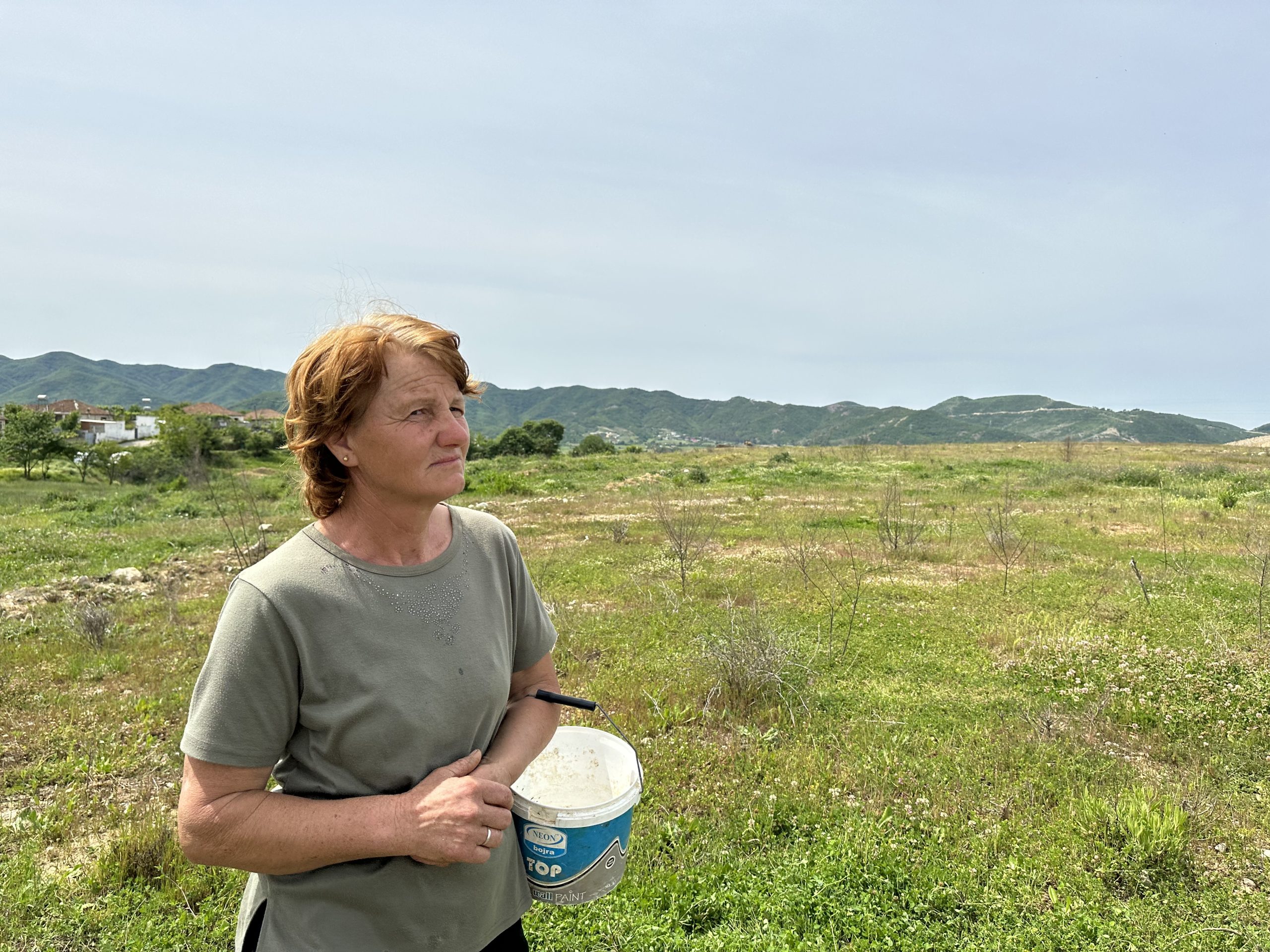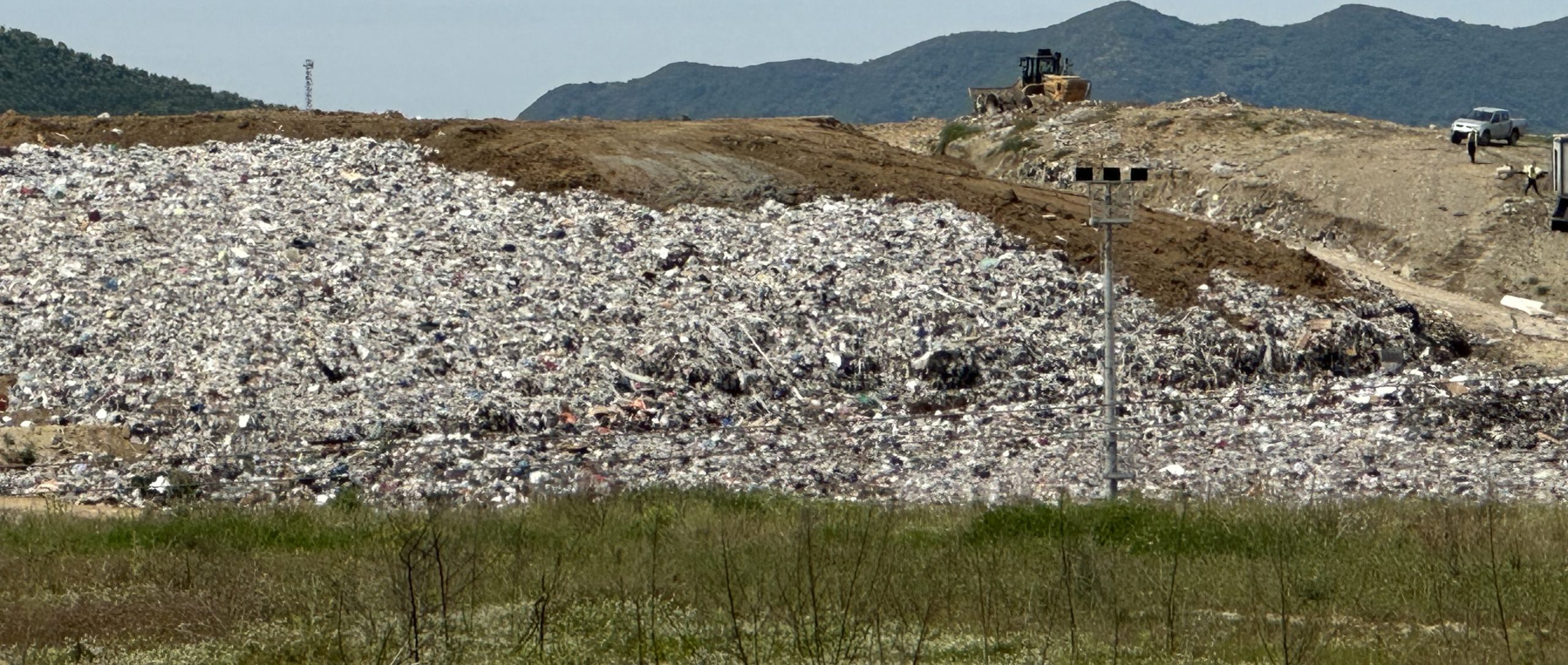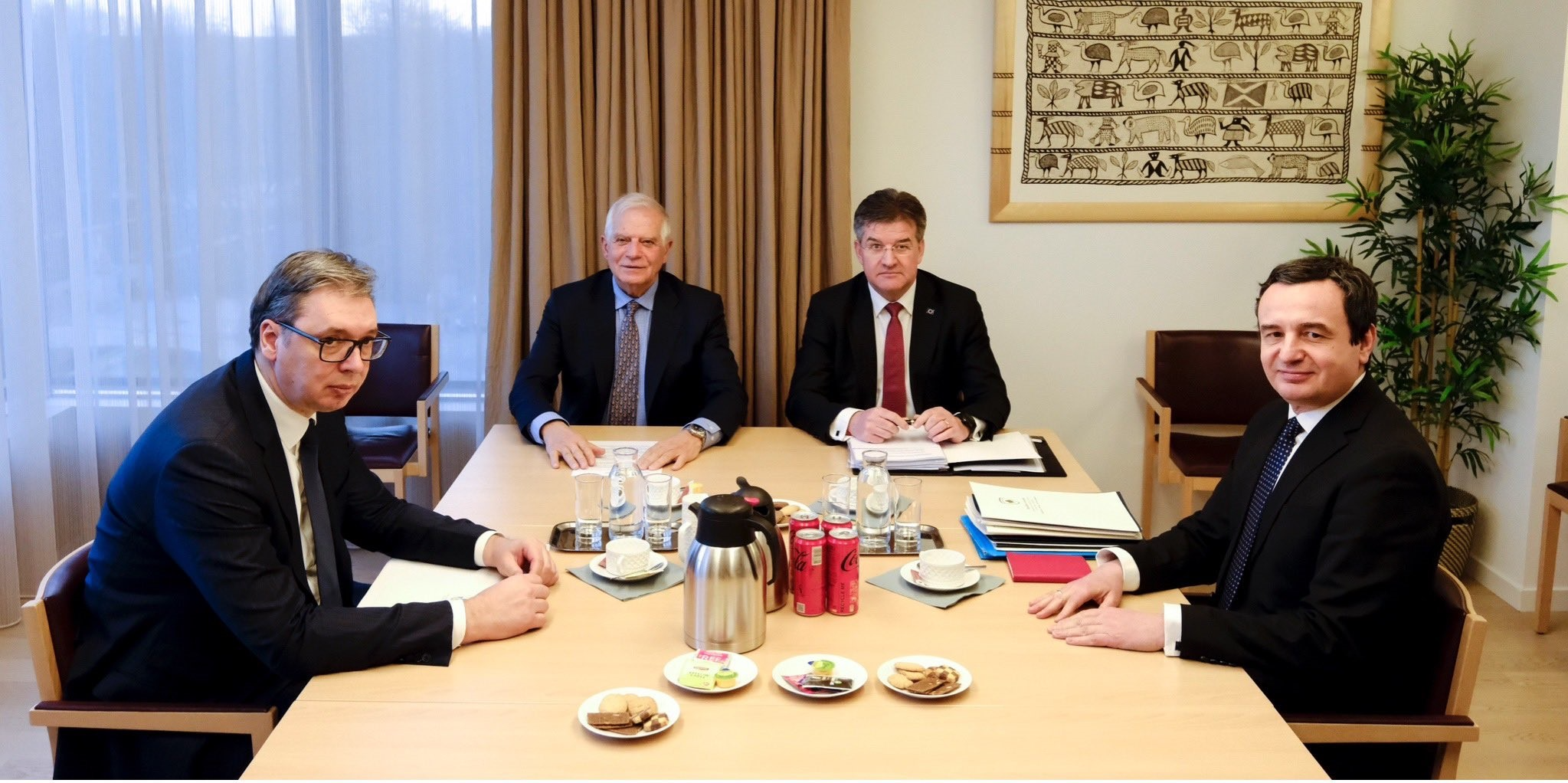An incinerator that was never constructed is triggering an environmental crisis in the Sharra region of Tirana. The landfill has surpassed its permitted capacity with garbage. Alongside the pollution caused by the waste, locals are also grappling with a water shortage. Environmental experts have labeled the situation as critical.
Esmeralda Topi
On the morning of May 7th, Xhuli Lamuça was tending to his cows in the field adjacent to the Tirana landfill, in the village of Sharra. To access the land that once belonged to them, Xhuli and other villagers must navigate through the gap they’ve created in the fence opened by the concessionaire using metal mesh.

Xhuli Lamuça, resident of Sharra village
For more than a month, the already challenging living conditions for the people of Sharra have been compounded by unpleasant odors and pollution, alongside a water shortage.
‘When the incinerator was being constructed, our water sources were cut off, but we were promised daily water deliveries by tanker,’ recalls Xhuli, highlighting that for over a month now, they’ve had to purchase water themselves.’
‘I pay 15,000 old Lekë (Albanian Lek) every day for the water I buy; I have to because I have cows and the dairy needs cleanliness. I sell the milk to buy water’, expresses Xhuli, with worry.
Following the loss of their lands due to expropriations for the Tirana waste treatment project, some residents have been employed by the concessionaire.
‘Not everyone is complaining, because some work in the waste sector and are concerned about losing their jobs. But even for those of us who are raising concerns, we aren’t seeing any solutions…,’ Xhuli sadly admits.
Landfill Overcapacity
The landfill in Tirana has a total capacity of 420,000 cubic meters of waste. The contract stipulated that the landfill would manage the demand until the incinerator was constructed, which would then burn the waste to generate electricity. However, the incinerator was never built. Consequently, last year, the waste treatment area reached its capacity limits for waste management.
| The Contracting Authority has not yet approved the request from the company “Integrated Energy BV SPV shpk.
Following the expiration of the 60-day calendar deadline and the establishment of the holding capacity for urban solid waste, “Integrated Energy BV SPV shpk” finds itself in a challenging situation regarding waste management. After conducting a technical assessment of the current site conditions, the company has proposed a temporary solution to continue waste deposition in an existing deposition area. This area has a capacity of 100,000 m3, with the holding capacity for urban solid waste deposition not exceeding 90 calendar days.
In order to amend the designation of point “13” in Decision no. 52, dated 28.12.2020, of the Contracting Authority , changing it from “13. Non-radioactive hazardous waste landfill’ to “13. Additional cell of object 13 (landfill of urban solid waste),” the company “Integrated Energy BV” has requested approval from the Contracting Authority and has taken the following measures:
|
In these conditions, Integrated Energy (managed by the Agency of Sequestered or Confiscated Assets) urgently requested permission from the responsible authorities to construct an additional cell for the deposition of urban solid waste.
However, the new cell has not yet received approval from the responsible authorities. This means that currently, Sharra is exceeding its waste management capacity. Arjan Baçi, appointed by the state to oversee the waste treatment company in Tirana, stated they are still awaiting clarification regarding the requested permit.
‘We are managing the situation’, Baçi responded briefly, without providing details. According to him, for further information, an official request was needed, but efforts to obtain information through the information rights coordinator have failed since March.
Mountains of garbage in Sharra
Scenes from Sharra confirm the emergency. Municipal waste heaps from the Tirana district are becoming mountains in the landfill. Pollution remains far from the homes of the authorities who promised garbage elimination but continues to affect the village residents.
‘We’re stuck between two mountains of trash, as if we don’t have a problem?! In summer, and when it rains, the garbage spreads all over Sharra…’ complains Xhuli Lamuça, a resident of Sharra.

Unlike Elbasan, a significant portion of Tirana’s landfill is covered with soil. However, experts warn that the problem persists. They sound the alarm for an environmental emergency.
‘These sites aren’t proper landfills; rather, they’ve become dumping grounds destined for burning. Yet, they remain unburned, ticking like an ecological time bomb. We’re looking at mountains of waste’, remarks Olsi Nika from ECO Albania.
Despite this grim reality, the incinerator meant to dispose of this waste has been devouring public funds for years.
This year alone, the elusive Tirana incinerator (under ongoing SPAK investigation) is set to receive a staggering 12 million euros from the state budget. And this financial support is planned to continue in the years to come.
‘The money is being taken off as if the incinerator was operating at full capacity. So, taxpayers are not only burdened by environmental pollution but also by rampant corruption’, asserts environmental expert Ahmet Mehmeti.
According to official figures from the Ministry of Finance, over the past seven years, approximately 122 million euros have been allocated from the state budget for all three contracts. It’s anticipated that millions more will be disbursed in the coming years.
In lieu of the incinerator…
Given these circumstances, Olsi Nika predicts that the government will have to admit the failure of the incinerators and seek new solutions.
‘They will budget again for their disposal. Because waste management starts at your home and mine, and this chain has never been taken seriously in Albania. There have been pilot programs, shows, strategies, and there is no will because waste equals money,’ he contends.
Meanwhile, Mihallaq Qirjo, a professor at the Faculty of Natural Sciences, sees recycling as the answer.
‘We still look at landfills and incinerators for solutions, when we should be focusing on reusing materials that have completed one cycle of use. So, I believe there’s still room for the country’s development on a greener path,’ -says Mihallaq Qirjo.
Even the European Commission, in its latest report on Albania, emphasized the need to promote a circular economy, encouraging waste prevention, reduction, and minimizing landfill usage.
However, the only concrete step toward a circular economy in Albania came this year – without addressing the issue of incinerators. In March, the government established the National Waste Agency under the Ministry of Tourism and Environment.
‘The NWMA will provide technical support for the ministry’s environmental policies in integrated waste management, aiming for a transition to a circular economy (the primary concept of which is waste minimization through reduction, reuse, recycling),’ stated the Ministry of Environment in a written response.
The agency will employ 26 people, but its approval process is still ongoing. Nonetheless, environmental experts don’t see waste management solutions being realized solely through an agency.
Background
The concession for waste treatment in Tirana was signed on August 31, 2017, between the Ministry of Environment and the Netherlands-registered company – “Integrated Energy” B.V. This contract aimed to rehabilitate waste disposal sites in Sharra and construct a landfill and an incinerator for electricity production.
‘See how we’re winning the battle for a clean European Albania, right in the heart of our nation, through a new model based on European Union waste standards, with zero negative impact on air quality and health,’ proudly declared Prime Minister Edi Rama when unveiling the 3D video of the Sharra project, almost a year after signing the contract.
According to the Prime Minister, this model would rid all the country of waste curse – not just in Tirana, Elbasan, and Fier.
‘Don’t pay attention to the political and media noise against these projects, which are so beneficial for the environment and health…,’ insisted Rama in May 2018.
However, time proved otherwise. The Elbasan incinerator isn’t operational, the one in Fier remains unfinished, and the one in Tirana doesn’t even exist. Currently, the incinerators are under seizure by the Special Prosecution Office against Corruption and Organized Crime. SPAK investigations concluded that the contracts were riddled with corruption, leading to dozens of arrests, including high-ranking public officials.
This article was written by journalist Esmeralda Topi, with support from Journalismfund Europe.






